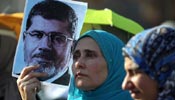 Chinese Air Force's combat group organizes actual-combat training
Chinese Air Force's combat group organizes actual-combat training Owner ordered to demolish building
Owner ordered to demolish building
 Fan Bingbing covers COSMO Bride
Fan Bingbing covers COSMO Bride
 Pakistan celebrates Independence Day
Pakistan celebrates Independence Day
 Collective wedding ceremony for 'Beijing drifters’ held in Happy Valley
Collective wedding ceremony for 'Beijing drifters’ held in Happy Valley
 Colorful houses around the world
Colorful houses around the world
 Protests held in Gaza, Jordan to support Egyptian people
Protests held in Gaza, Jordan to support Egyptian people
 Questioning China's real achievements
Questioning China's real achievements
 2013 IAAF World Championships: men's 5000m heats
2013 IAAF World Championships: men's 5000m heats
Chef Lai inspects the cakes carefully and sometimes “redoes” three cakes among 10 because the decorative lines are the crust are not clear enough.
He insists on perfection.
“Mooncakes represent family reunion and bring happiness. No matter how hard the work is, I consider making mooncakes a way of expressing happiness,” says chef Yip.
He believes that dedication determines the quality and flavor.
Hard to continue
Consumers snap up these special mooncakes because handmade cakes are rare. No more than 10 places in Shanghai offer handmade mooncakes.
Lack of dim sum chefs is part of the reason.
“If I had been born into a wealthy family and well educated, I would not have become a dim sum chef,” says chef Lai.
His son shows a keen interest in making dim sum, but the father is strongly opposed.
“Being a dim sum chef is too hard,” he says.
Compared with the prospects of Western pastry chefs, the future of Chinese dim sum chefs is less promising, although the professional skills of the two are similar.
In the West, chefs and pastry chefs enjoy nearly equal status and both can become executive chefs, food and beverage directors and even higher. Both can open their own restaurants or bakeries, publish their recipes and even become celebrity TV chefs.
However, a dim sum chef always plays a subordinate role in a Chinese kitchen, generally subordinate to a cook.
Dim sum chefs are not even called chefs by customers but shifu, a respectful form of address generally used for people engaged in specialized trade.
“It’s nearly impossible for a dim sum chef promoted to executive chef in a hotel,” says a hotel insider, declining to be quoted by name.
It is also difficult to find any store or restaurant selling nothing but dim sum in China.
 |  |
 Air Force's combat group conducts flight training in joint drills
Air Force's combat group conducts flight training in joint drills Protests held in Gaza, Jordan to support Egyptian people
Protests held in Gaza, Jordan to support Egyptian people Various sun protective outfits
Various sun protective outfits Top 10 most dangerous jobs in the world
Top 10 most dangerous jobs in the world Summer scenery in Lhasa, China's Tibet
Summer scenery in Lhasa, China's Tibet Cristiano Ronaldo and his beautiful fans
Cristiano Ronaldo and his beautiful fansDay|Week|Month